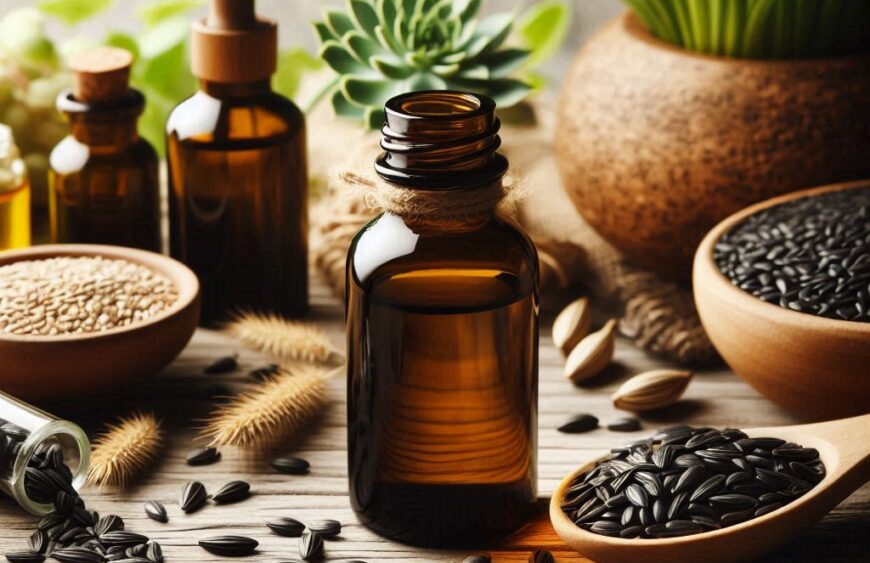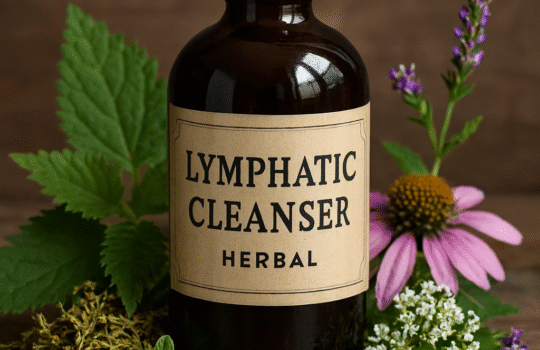Black seed oil has been used medicinally for thousands of years in the Middle East, Asia, and Africa. Often called “the oil of blessing” or Nigella, this ancient remedy is now experiencing a resurgence in holistic health circles. Its chief bioactive compound, thymoquinone, has a broad range of effects on the body.
Researchers describe black seed oil as “immunomodulatory, analgesic, antimicrobial, antidiabetic, and anti-inflammatory”. In plain terms, this means black seed oil can help balance the immune system, reduce pain and inflammation, fight germs, and even influence metabolism.
Key Health Benefits
-
Immune Support & Inflammation: Black seed oil helps regulate the immune response, preventing overreaction (inflammation) while still fighting invaders. In lab and small clinical studies, it has demonstrated significant anti-inflammatory effects. For example, taking black seed oil or using it topically has helped reduce inflammatory skin conditions. Its actions are similar to mild antihistamines or anti-inflammatory drugs, but without many side effects.
-
Skin and Acne Care: Topical use of black seed oil can soothe the skin. Research shows its antibacterial properties are effective against acne-causing bacteria. In one study, an acne gel containing black seed extract used twice daily cut acne severity by 78% over 60 days. The oil also moisturizes and contains vitamin E, helping with eczema, psoriasis, and wound healing.
-
Respiratory Relief: Traditional texts mention black seed for asthma and coughs. Modern studies support this: a review found inhaled or oral black seed oil improved breathing and lung function in asthmatics, acting as a natural bronchodilator. Many users find it helps reduce allergy symptoms and ease breathing (perhaps by reducing airway inflammation).
-
Digestive Health: Black seed oil is carminative, it relieves gas, bloating, and indigestion. It also has mild antimicrobial effects in the gut. Some people take it to support gut healing and soothe stomach upset.
-
Metabolic and Cardiovascular Effects: Emerging research indicates black seed oil may benefit the heart and metabolism. In one controlled trial, people taking ~2.5 mL of black seed oil daily for 8 weeks saw significant drops in blood pressure, total cholesterol, LDL cholesterol, and fasting blood sugar compared to placebo. This suggests it may help protect against hypertension and metabolic syndrome. Antioxidant content also supports artery health by reducing oxidative stress.
-
General Wellness: The oil is rich in antioxidants (like vitamin E and phenols), which neutralize free radicals and may reduce chronic disease risk. It has mild antibacterial and antiviral actions, so some people use it for immune resilience during cold/flu season. It’s also reported to have a calming effect, helping to reduce stress and even improve mood in small studies (though more research is needed on this).
Traditional Use and Modern Findings
Historically, black seed oil was a staple remedy for nearly every ailment. Ancient texts tout it as “a remedy for everything except death.” In modern times, science has validated many traditional claims. For instance, Cleveland Clinic experts note its antibacterial and anti-inflammatory nature can calm acne and skin irritations. Healthline reviews summarize that black seed oil “may reduce acne,” improve skin health, and even slow psoriasis symptoms with both oral and topical use.
On the whole-body level, a 2025 review article highlights black seed oil’s multi-faceted potential. It cites studies showing benefits in areas such as diabetes, hypertension, liver disorders, asthma, and even neurodegenerative conditions. In other words, many health issues linked to inflammation and oxidation can potentially be influenced by black seed oil’s bioactives.
Nonetheless, experts advise viewing it as a complement, not a sole treatment: more large-scale trials are still needed. It’s always best used alongside a healthy lifestyle, a balanced diet, exercise, and medical care when necessary.
Using Black Seed Oil
In practice, black seed oil can be taken in various ways. A common dose is about 1 teaspoon to 1 tablespoon daily (either straight or mixed into smoothies, honey, or herbal tea). Some prefer capsules containing cold-pressed black seed oil for convenience. Topically, it can be gently massaged onto skin or blended into skin creams and shampoos for scalp and hair benefits.
Herbs & Spices by Bukky offers 100% Pure Black Seed Oil – 100mls. According to the product details, it “has been used for centuries for its medicinal and therapeutic properties,” including being anti-inflammatory, antioxidant, and supportive of skin, hair, and immune health. You can apply a few drops to the face to help acne (or even use as a spot treatment at night) or take it internally to potentially help with respiratory, digestive, or metabolic concerns.
Other uses of black seed oil:
-
Hair and Scalp: Its antimicrobial action can improve scalp health. A 2020 review found that black seed extract applied for 3 months increased hair density and thickness in people with hair loss. Some users mix black seed oil into hair masks or use it as an overnight scalp treatment.
-
Oral Health: Rinsing with diluted black seed oil may help reduce mouth bacteria and promote gum health (due to its antiseptic effects).
-
Joint Pain: Given its anti-inflammatory and analgesic properties, some take black seed oil to alleviate mild joint discomfort (especially in conditions like arthritis). This is similar to how turmeric might be used, but on a whole-body level.
Takeaways
-
Powerful Active Compounds: Black seed oil’s thymoquinone provides broad anti-inflammatory and antioxidant effects. This underlies many of its health claims (from immune support to cancer research).
-
Skin and Hair: It is proven to improve acne (reducing lesions up to 78% in trials) and may support hair regrowth by nourishing follicles.
-
Metabolic Health: Preliminary trials show it can modestly lower blood pressure, cholesterol, and blood sugar levels. It is not a replacement for prescribed medications but can complement a healthy lifestyle.
-
Safe Adjunct: When used as a supplement (e.g. a teaspoon daily), black seed oil is generally safe for most adults. (Pregnant women and people on certain medications should consult a doctor first.)
-
Product Highlight: We recommend Herbs & Spices by Bukky Black Seed Oil (100ml) – a high-quality, cold-pressed oil. Incorporate it into your wellness routine by taking the recommended dose or using it topically to see its full-spectrum benefits.
From skin to stomach to systemic wellness, black seed oil offers a holistic boost. While more research is emerging, its long history and modern studies both support using it as a daily supplement to enhance immune function, reduce inflammation, and promote overall vitality.






